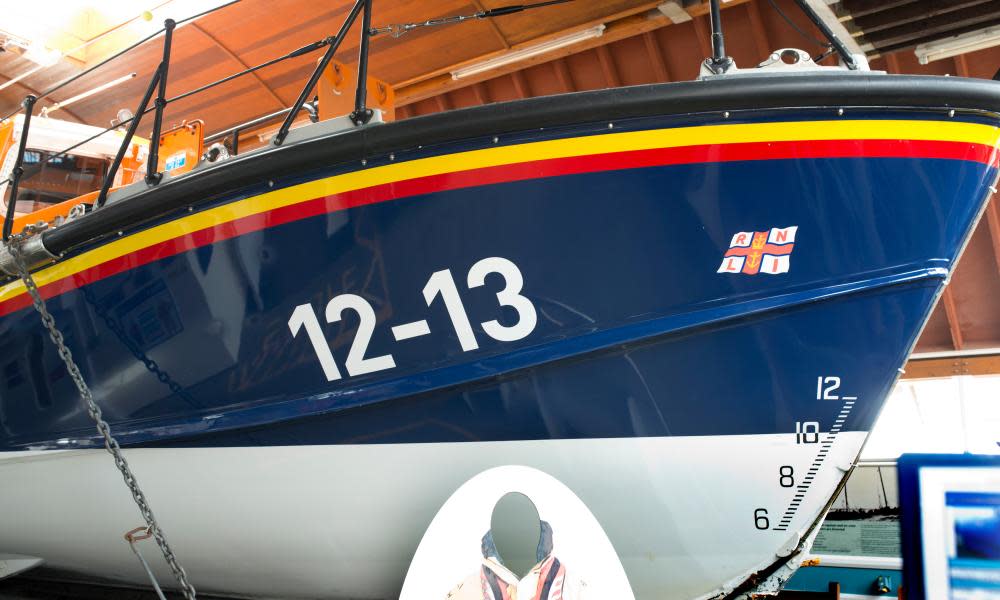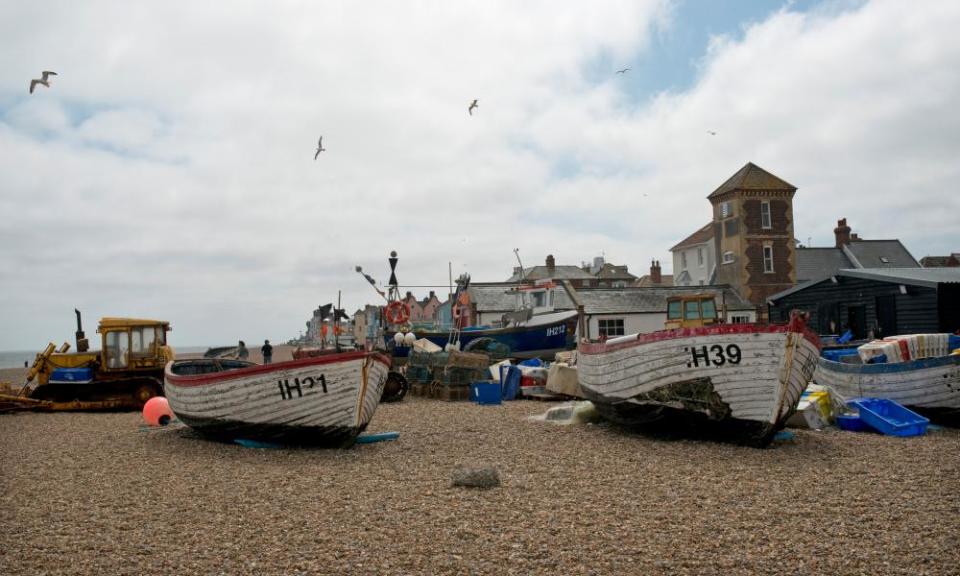‘Putting lives at risk’: UK coastal towns revolt against smaller lifeboats

Lifeboats have been in Aldeburgh for centuries, even before the Royal National Lifeboat Institution was founded 199 years ago. On the stony beach of the Suffolk town sit two venerable lifeboat huts, a legacy of a time when two rival crews would row into the North Sea in a race to save lives – and get first salvage rights.
“They never spoke to each other. They drank in separate pubs and had separate lives,” says Derek Wyatt, the former Labour MP who, until recently, was chair of the Aldeburgh Lifeboat Guild, which fundraises for the RNLI.
He resigned due to a more modern rift – with the RNLI’s national leadership. They are reviewing whether Aldeburgh needs a large, all-weather Shannon-class lifeboat capable of rescues in very rough conditions far out at sea or just a smaller inflatable inshore Atlantic 85 that must stay closer to the coast.
“We had this terrible meeting in February, a packed meeting with maybe 30 or 40 people,” Wyatt says. “And it was clear that we weren’t going to get the [larger] boat.” He is worried that volunteers will become demoralised with a smaller boat.
“Our shop is in the top 10% in the UK. People come here and spend money because they love the RNLI – our population is just 3,000. I don’t know if enough volunteers will stay or they’ll fizzle away.”
Aldeburgh is not alone. About 30 miles down the coast in Essex, a local campaign has sprung up to overturn a decision to replace the Walton and Frinton station’s 16m Tamar class lifeboat, the Irene Muriel Rees, with a 4m D-class rigid inflatable boat. The volunteer operations manager, Stewart Oxley, has been “stood down” permanently – officially because he is accused of breaching the code of conduct when launching a rescue on 4 April. But Oxley said in a social media post that his opposition to the “scandalous decision by the RNLI” was the reason.
“I believe this is the root cause of the current situation and the comments I made at the end of March about the RNLI’s disrespectful attitude in refusing to attend a public meeting with the community did little to endear me with the powers that be.”
And there is considerable local anger in Angus in Scotland that Arbroath’s lifeboat will similarly be replaced. A Shannon will go to Broughty Ferry in the mouth of the river Tay 15 miles away, while Arbroath will get an Atlantic 85. Angus council has objected and MSPs and MPs have raised the matter in parliament, while most of the volunteer crew members have signed a letter saying they will not train or use the new boat when it arrives this week.
“They’re putting an all-weather lifeboat in an in-shore position and an in-shore lifeboat in an open sea position,” said Alex Smith, the operations manager for Arbroath. “I’ve sailed here for 52 years. I’m not going to be responsible for putting a boat like that into the open water in the North Sea. We launched in Storm Arwen – we couldn’t do that. It’s putting lives at risk.”
The three disputes are the result of what the RNLI calls a Lifesaving Effect Review, where it looks at the overall effectiveness of its 238 stations and 400-strong fleet. The number of rescues has been falling in some parts of the UK and it says the new Shannon lifeboats are faster. Walton and Aldeburgh might get smaller boats, but RNLI research and modelling has led them to the conclusion that the seas can be covered by larger boats at Clacton-on-Sea and Harwich.
Another factor is whether the existing stations can hold a new Shannon. Arbroath would need a £2m refit while Broughty Ferry needed no modification, a spokeswoman said. The Walton lifeboat is at the end of Walton pier which is difficult to access. Aldeburgh’s lifeboat needs to be towed across the pebbles to the water.

Mark Dowie, RNLI chief executive, said: “The focus of everyone at the RNLI is on our core purpose of saving lives at sea. We must always ensure we have the right lifeboats at the right locations to deliver the very best lifesaving service to meet the demands of specific stretches of coastline.
“The safety of our crews is an absolute priority, and we would never ask them to go to sea in a lifeboat that wasn’t fit for the conditions they will face.” He added that it was important to use donors’ money wisely. The RNLI saw an increase in donations in 2022 after attacks on the charity by rightwing groups for helping save the lives of asylum seekers in the English Channel.
‘We understand our volunteers’ passion, dedication and attachment to their local lifesaving vessels, but that cannot prevent us from making changes which will improve our lifesaving service and could ultimately save more lives,” Dowie said.
Related: After rightwing attacks on rescues, UK lifeboat charity has record fundraising year
Yet the local campaign groups dispute some of the research and say the RNLI hasn’t listened to their concerns. Since nearly all of the charity’s lifeboats are crewed and managed by unpaid volunteers, and funded by local guilds, they have no reason to go quietly. And there are strong family connections as well.
“This is the 70th anniversary of the Arbroath lifeboat disaster – it was lost just outside the harbour,” Smith said. “My mother’s family lost people on that boat, two cousins. It’s personal for us.”
Oxley said in his Facebook post that his father, grandfather and great-uncle had managed the station before him. A member of the Walton and Frinton Lifeboat Campaign group said that the RNLI had been “disrespectful” to the local community. “The population of small coastal towns with lifeboat stations are the ones who keep it going,” said the campaigner, who asked not to be named. “They do jumble sales, quizzes, Christmas cards, charity events, and it’s the same people over and over again, all year.”
“We’ve been around for hundreds of years and these guys will be gone in three years,” said Smith. “We’ll still be here to pick up the pieces.”

 Yahoo News
Yahoo News 
